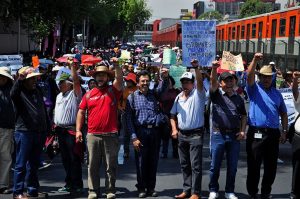 Clayton Beverly is among teachers and activists who gathered last month outside the Mexican Consulate in Albuquerque, New Mexico. The protesters demanded a halt to government attacks against Mexican teachers, an immediate dialogue with the striking National Coordinator of Education Workers (CNTE) and the release of jailed union leaders who are now “political prisoners in Mexico,” said Beverly, who is a member of the Albuquerque Caucus of Rank and File Educators.
Clayton Beverly is among teachers and activists who gathered last month outside the Mexican Consulate in Albuquerque, New Mexico. The protesters demanded a halt to government attacks against Mexican teachers, an immediate dialogue with the striking National Coordinator of Education Workers (CNTE) and the release of jailed union leaders who are now “political prisoners in Mexico,” said Beverly, who is a member of the Albuquerque Caucus of Rank and File Educators.
Activists also called for justice in the case of the 43 forcibly disappeared Ayotzinapa college students, and linked the struggle of Indigenous people in the United States with the movement of teachers in the Mexican state Oaxaca, where Indigenous people form a large percentage of the population.
According to Beverly, consular officials assured the protesters that a “full and impartial investigation” was underway of the June 19 Nochixtlan Massacre, when at least nine people were killed after police opened fire on striking teachers and townspeople in Oaxaca.
Separately, Oaxaca teacher Jose Caballero Julian was buried the first week of July after finally succumbing to injuries sustained during the police eviction last month of protesters occupying the Oaxaca State Public Education Institute last month. According to Mexico’s Proceso magazine, more than 100 members of the teacher union’s Section 22 in Oaxaca have been murdered over the years.
Beverly said Mexican government officials told the Albuquerque protesters that the labor conflict was mainly a regional one confined to Oaxaca, and that protesters in Mexico must “respect order and not block roads.”
“I feel they have well-worn talking points,” Beverly concluded about the Mexican government’s position. Additional groups participating in the Albuquerque protest included the Southwest Organizing 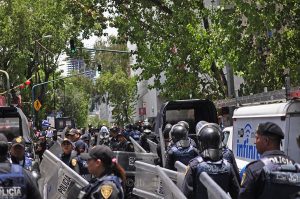 Project, The Red Nation and the Albuquerque Center for Peace and Justice, among others.
Project, The Red Nation and the Albuquerque Center for Peace and Justice, among others.
A common struggle
The June 24 New Mexico action was just one of hundreds that are sweeping Europe, Australia, Latin America and North America in support of Mexican teachers who struggling to overturn the 2013 education reform pushed by the Pena Nieto administration and approved by the Mexican Congress.
In the United States, recent pro-CNTE protests have been staged at Mexican consulates or other sites in Seattle, Los Angeles, Watsonville (California), Houston, Dallas, Raleigh, Chicago, and Albuquerque, according to press accounts. Both the American Federation of Teachers (AFT) and the AFL-CIO have issued statements condemning the Nochixtlan violence and the attacks on teachers.
Maria Moreno, Chicago Teachers Union financial secretary, said union members and other activists held two protests at the Mexican Consulate in her city, the first in May when the Mexican government fired thousands of teachers and the second in June after the Nochixtlan Massacre. Weeks later the activists still have not received a response from the Mexican government to letters they delivered expressing concern about actions against teachers, Moreno said.
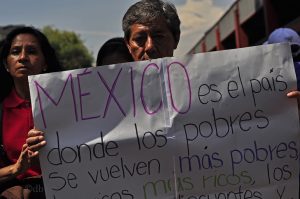
A 14-year veteran of the Chicago public schools and union, Moreno characterized educational reform policies unfolding in Mexico as comparable to similar ones already established in the United States connected to “neo-liberal globalization,” including the greater use of standardized tests to evaluate teachers and students, merit-like pay for educators taking the new evaluation exams, budget cuts, privatization, and attempts to disband rural teacher training schools in favor of Teach for America-like programs that dispense with professional teacher training based on the theory that “anybody can teach.”
“It’s a really important thing that educators in the U.S. support the struggle that the teachers in Mexico are waging,” she added.
In Albuquerque, a resolution pending with the local affiliate of the AFT expresses solidarity with the CNTE and the teachers who have been fired for not taking the government-mandated evaluation tests. Beverly, who is also an AFT school representative, said the resolution was presented at a recent meeting of more than 100 local union representatives, prompting discussion over “bread and butter” issues as opposed to broader concerns.
“It was an interesting moment, because a lot of people didn’t know a thing about it,” Beverly recalled. “One guy was opposed saying, ‘It didn’t belong in the union’.” Several others, however, fielded positive comments, he said.
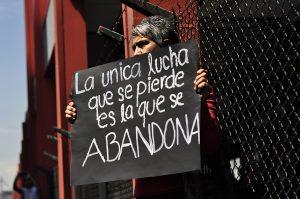
Along with the pro-CNTE resolution, the union activists are mulling a resolution in support of The Red Nation’s campaign to abolish the official University of New Mexico seal deemed racist, and to compel the university to adopt policies that respect Native culture and the involvement of Indigenous students and scholars in the life of the institution.
Linkages between U.S, Mexican, Canadian and Puerto Rican teachers in defense of public education and labor rights have been gradually building up over the past two decades, thanks to the passage of the North American Free Trade Agreement (NAFTA) and events such as the 2006 Oaxaca Rebellion, a teacher-sparked movement that also turned bloody following government repression.
Educators from the NAFTA countries formed the Tri-national Coalition in Defense of Public Education in 1993. The convergence identifies neo-liberalism, privatization and trade pacts like NAFTA and the proposed Trans-Pacific Partnership as forces leading to the commodification of education and the erosion of labor rights.
“We are all being terrorized by neo-liberal politics,” Karen Lewis, president of the Chicago Teachers Union, was quoted as saying in a report by Roshan Bliss on the 2014 Tri-national Coalition conference held in the Windy City. This year’s conference was held in Vancouver, Canada, with the next meeting scheduled for Mexico two years from now, according to Moreno.
“(The Trinational Coalition) provides a space for educators to come together” in not only the hemispheric defense of public education, but for “planning solidarity with each other,” the Chicago union official said. In 2016, activists are contemplating September actions to mark the second anniversary of the forced disappearance of the 43 Ayotzinapa college student teachers in Iguala, Mexico, and World Teacher Day on October 5, Moreno said.
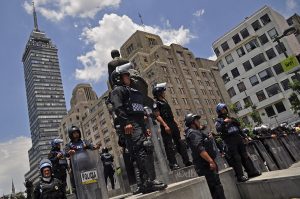 Coalition activists are also broadening their work with young people who are becoming increasingly active around educational issues, she added.
Coalition activists are also broadening their work with young people who are becoming increasingly active around educational issues, she added.
In Chicago, where the majority of public school students are African American or Latino, issues of budget cuts, school closures and other attacks on public education hit home. The struggle of Puerto Rican educators and students against the austerity regime being foisted on the U.S. colony also resonates in Chicago, home to a large Puerto Rican community.
“We also stand in solidarity with the Puerto Rican teachers and their unions who are trying to stop this,” Moreno affirmed.
The Tri-National Coalition identifies several major actors as playing leading roles in undermining public education, including the Organization for Economic Cooperation and Development (OECD) and its system of ranking member states in educational proficiency as defined by narrow parameters; corporations like London-based Pearson that profit from increased reliance on for-profit standardized testing; and private foundations like the Bill and Melinda Gates Foundation that wield big dollars and influence.
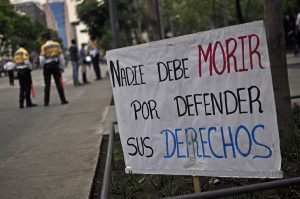
In both Mexico and the United States, teacher-bashing by politicians and business leaders is widespread. Scapegoating educators, especially union members caricaturized as privileged public employees, for the dismal conditions of underfunded public schools and the performance of students who hail from impoverished homes and broken families and suffer many stresses that impair learning is a common narrative in the mass media.
Mexico’s 2013 education reform law, which requires teachers to pass standardized evaluation tests or face dismissal, was inspired in part by the OECD, backed by business groups like Mexicanos Primero and originally promoted by the conservative Calderon administration before Pena Nieto became president.
The 2013 law also is under fire for opening the door to privatization by placing more responsibility for school maintenance on school staff and parents.
“You want an English teacher, Coca Cola might be the sponsor,” said Mexican teacher activist Jose Nava during the first protests that greeted the 2013 law. Pena Nieto administration officials deny the intent of the reform is to privatize public education.
But in the state of Oaxaca and other Indigenous regions of Mexico, the law clashes with social realities and cultural sovereignties.
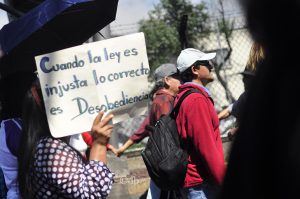
Writing in the Guerrero daily El Sur, Margarita Warnholz sketched the rustic conditions indigenous bilingual educators confront in their daily lives, including the lack of textbooks and even classrooms, mixed grade classes of students, hungry pupils and poor or non-existent transportation.
Though many bilingual teachers might not pass the standardized evaluation exams, they nevertheless endure conditions “no urban teacher could…,” Warnholz wrote. Indigenous bilingual educators are deeply appreciated by the community and frequently immerse themselves in the people’s everyday problems, according to the columnist.
In an interview, Dr. Lois Meyer, bilingual educator and professor of education at the University of New Mexico, described how the education reform law is playing out in Oaxaca. Meyer has spent a good part of the last 17 years in Oaxaca, collaborating with Indigenous teachers in developing pedagogies appropriate for their communities and promoting educational exchanges.
According to Meyer, the education reform promulgated in and imposed by Mexico City perpetuates a still-centralized educational system that doesn’t take into account cultural, linguistic and socio-economic differences or recognize the validity of indigenous community.
“School reform and teacher training processes have not in any way prioritized providing Indigenous teachers with the strength in their own community values, language skills… the training programs are all coming out of Mexico City,” Meyer contended.
Commanding great respect in rural Oaxacan communities, teachers now fear that their jobs, which constitute one of the few stable professions in an impoverished state, are in jeopardy from the reform law and assaults on the CNTE. “They’re struggling for their p
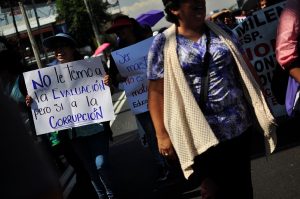
rofession and their communities,” Meyer said.
Standardized testing is also a contentious issue in the United States, where the academic assessment method was virtually institutionalized by the No Child Left Behind Law and a host of similar state-based laws and regulations.
It has also proven to be a lucrative business for private testing firms like Pearson.
Albuquerque educator Beverly, who teaches science and Spanish language arts at a middle school, said the standardized testing now saps weeks of valuable classroom time, demoralizes students, turns the curriculum into a scripted lesson and de-professionalizes teaching. “Every school I’ve been in, (teacher) morale is down and turn-over up,” he said.
In February and March 2015 thousands of New Mexico high school and middle school students voted no against Pearson’s PARCC, a state mandated test, by staging historic walkouts across the state. The protest netted a partial victory, with the time dedicated to PARCC significantly reduced but not entirely eliminated.
“I would say that is a major victory,” Beverly opined. “The governor and the PED (Public Education Department) would never say that, but I think it was direct action from students, protests, that pushed that into being.”
For Beverly clear parallels exist between the struggle of the Mexican teachers and their counterparts in the U.S.
“I think we are both fighting the corporate neoliberal education reform that is being impose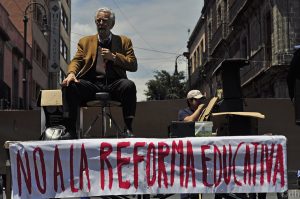 d to break the power of organized labor and open up the market for people to make a lot of money off of it,” he said. Beverly added that the conditions confronting U.S. and Mexican teachers are not exactly the same since the latter face far more repression and impoverishment than do their northern colleagues.
d to break the power of organized labor and open up the market for people to make a lot of money off of it,” he said. Beverly added that the conditions confronting U.S. and Mexican teachers are not exactly the same since the latter face far more repression and impoverishment than do their northern colleagues.
Meyer agreed that teachers on both sides of the border face different circumstances, but that the future north of the dividing line might end up being closer to the contemporary reality south of it than is realized. People in the United States, she posited, “really need to read the tea leaves that so much happening around (Mexican) school reform could potentially happen here.”
Mexican Teachers’ Protests Spread
In Mexico, meanwhile, the “isolated” struggle of the Oaxaca teachers as described to Beverly by Mexican Consulate officials is proving anything but.
In the aftermath of the Nochixtlan Massacre, teacher protests and strikes expanded well beyond the CNTE’s bastions in the states of Chiapas, Oaxaca, Guerrero and Michoacan, shaking the heart of Mexico City, surprising industrial Monterrey, and even appearing in the rural Chihuahua towns of Guachochi and Delicias. Parents and schoolchildren were key participants in the latest demonstrations, according to Mexican social media and news outlets.
As the 2015-16 school year comes to an end in Mexico, teachers’ grievances mount, regarding long overdue paychecks, irregularities in the evaluation test, disappeared seniority rights, unfair school transfers, temporary work contracts, and other examples of increasingly precarious employment conditions.
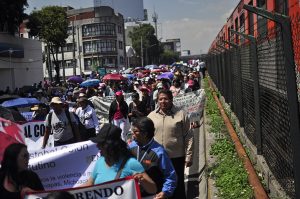 Business groups rail against the CNTE for allegedly jeopardizing summertime tourism with highway blockades and militant tactics, but others are joining in with the teachers in protesting the educational and other structural reforms- public sector doctors and nurses, small farmers, environmentalists, striking miners in Guerrero, Chiapas’ Zapatistas, and maquiladora workers in Ciudad Juarez. In Chiapas, the teacher strike has “transformed into a teacher and popular movement,” local CNTE leader Pedro Gomez Bamarca told Proceso magazine.
Business groups rail against the CNTE for allegedly jeopardizing summertime tourism with highway blockades and militant tactics, but others are joining in with the teachers in protesting the educational and other structural reforms- public sector doctors and nurses, small farmers, environmentalists, striking miners in Guerrero, Chiapas’ Zapatistas, and maquiladora workers in Ciudad Juarez. In Chiapas, the teacher strike has “transformed into a teacher and popular movement,” local CNTE leader Pedro Gomez Bamarca told Proceso magazine.
“We support the teachers in Mexico. Their struggle is our struggle in the U.S.,” said the CTU’s Maria Moreno. “It’s a huge fight, and a lot of these policies originated in the U.S. with this corporate education reform.”
Photos: Deborah Poo, Teachers’ March, Mexico City, July 6
Resources:
The Albuquerque Caucus of Rank and Filed Educators: https://albu-core.org/
Oaxaca electronic popular news: http://educaoaxaca.org/la-minuta.html
The Trinational Coalition for the Defense of Public Education:
http://www.trinationalcoalition.org/contact.htm
The Red Nation: https://therednation.org/
https://www.facebook.com/therednation/
Chicago Teachers Union: http://www.ctunet.com/
Article on Lessons of Oaxaca Teacher Resistance: http://www.truth-out.org/opinion/item/33245-teachers-resistance-in-oaxaca-offers-lessons-for-us-activism
2015 New Mexico Student Walkouts: https://fnsnews.nmsu.edu/new-mexico-students-walk-out-over-standardized-testing/
Tri-national Conference in Defense of Public Education, “Constructing alternatives to neo-liberal policies in education”, 12th Conference, May 2016



